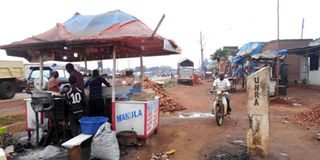Prime
UNRA moves to evict 500 from road reserve

One of the business stalls (for chapati) that was erected in a road reserve in Buwama Town Council in Mpigi District. Unra says that such structures shall all be destroyed. Photo by Sadat Mbogo
What you need to know:
- If any encroacher defies official orders to pull down illegal structures erected on road reserves, the Authority can raze it or the encroacher, upon conviction by court, is liable to a fine not exceeding Shs1,000.
- Road reserves, among other things, are used for conveying utilities, expanding the carriageway and planting trees to beautify the road.
Kampala. Developers, whose structures extend into the gazetted road reserve on the Kampala–Masaka highway in Mpigi District, are stranded after Uganda National Roads Authority (UNRA) finalised plans to pull down their structures.
Daily Monitor has learnt that at least 500 structures erected on roads stretching from Busega Roundabout on the border of Kampala and Wakiso districts on Kampala-Masaka highway through Mpigi and Buwama Town Council, Kayabwe Town Council through Lwera wetland, Lukaya Town Council up to Nyendo road junction in Masaka District, are going to be affected.
These include petrol stations, perimeter wall fences of residential houses, business stalls, boda boda stages and gardens.
According to Mr James Aggrey Chelangat, the enforcement supervisor at Mpigi UNRA branch, they issued a notice to all encroachers asking them to voluntarily vacate the road reserves, but since many are still adamant, they have decided to forcefully evict them by pulling down their property.
“We asked them to move away from the 15 metre-yellow line and leave at least three metres as the building line, but they kept a deaf ear. Let us force them away to secure their lives from road accidents and keep order on the road,” says Mr Chelangat.
However, he declines to reveal the exact date when the operation will be carried out, but insists it would take place soon.
“We cannot tell them [road encroachers] the exact date, but let them know that we are coming soon.” he adds.
However, he notes that UNRA will not compensate anybody with property in the road reserve with an exception of those whose property was in place in the 1960s before ministry of Works put mark stones.
“Most of the road encroachers we have in our inventory have cropped up in the past one to two decades and cannot claim for compensation, so they are there illegally and have to leave,” he says.
The eviction operations commenced with the Kampala- Entebbe expressway evictions early this year.
They are expected to be extended to other national roads in Kampala Metropolitan area such as Jinja Road, Hoima Road, Bombo Road and other urban centres country.
In May this year , UNRA pulled down several temporary structures like kiosks, stalls, road side bars, taxi and special hire stages, fruit vending vans, flower vending businesses among others demolished, which were constructed in road reserves from Kibuye Roundabout to Entebbe.
Mr Robert Tumwine, the field operations manager, says it would be better if road encroachers vacate before bulldozers destroy their property.
“I think it will be wise if they vacate before they are forcefully evicted,” he says.
Mr Joseph Bwete, a resident of Buwama “A” Village, who operates a pork joint in a road reserve, urges government to consider resettling all those who will be displaced during the operation.
However, Mr Adam Nasser Zimula, the chairperson of Forum for Democratic Change (FDC) in Gombe Town Council, supported UNRA’s move, but asked them to spare temporary businesses like makeshift market stalls and boda boda stages.
“What they (UNRA) are planning to do is good but let them leave temporary businesses. However, the owners should work with Unra to ensure road safety and their stalls should be well organised,” he says.
A road reserve, according to the colonial-era Road Act 1949, is an “area bounded by imaginary lines parallel to and distant not more than 50 feet (about 16 metres) from the centre line of any road”.
Section 5 of the said Act mandates the Authority to “remove interferences” such as unauthorised building, plants/crops, access lanes, cattle paths and bicycle tracks from the roads which technically includes the carriageway, separators (island), shoulders, drainage channels, side-walks and road reserves.
If any encroacher defies official orders to pull down illegal structures erected on road reserves, the Authority can raze it or the encroacher, upon conviction by court, is liable to a fine not exceeding Shs1,000.
Road reserves, among other things, are used for conveying utilities, expanding the carriageway and planting trees to beautify the road.



